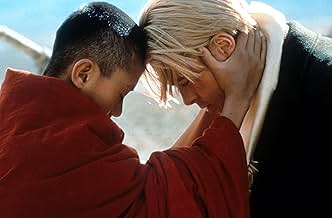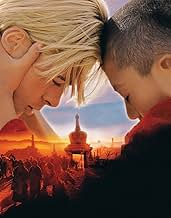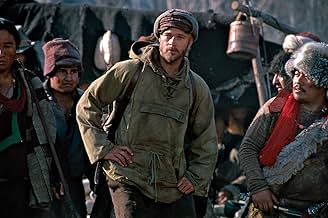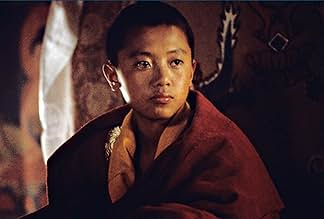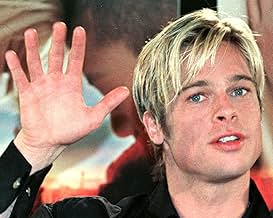Le parcours de rédemption dHeinrich Harrer, un alpiniste adulé en Allemagne, ayant en 1939 délaissé sa femme enceinte pour lHimalaya. Au terme dun périple il se dévouera à un enfant, le Dala... Tout lireLe parcours de rédemption dHeinrich Harrer, un alpiniste adulé en Allemagne, ayant en 1939 délaissé sa femme enceinte pour lHimalaya. Au terme dun périple il se dévouera à un enfant, le Dalaï-Lama, jusquà lappropriation brutale du Tibet par la Chine. [255]Le parcours de rédemption dHeinrich Harrer, un alpiniste adulé en Allemagne, ayant en 1939 délaissé sa femme enceinte pour lHimalaya. Au terme dun périple il se dévouera à un enfant, le Dalaï-Lama, jusquà lappropriation brutale du Tibet par la Chine. [255]
- Réalisation
- Scénario
- Casting principal
- Récompenses
- 3 victoires et 8 nominations au total
- Ngawang Jigme
- (as B.D. Wong)
- Lord Chamberlain
- (as Ven. Ngawang Chojor)
Avis à la une
It's not all surface though, there's depth here too. Don't believe the negative comments about Brad Pitt's acting. Admittedly his accent slips a bit in places, but he does a great job as Heinrich, both the unpleasant, arrogant character at the beginning, and the more gentle and wise man that he becomes as the film progresses. His relationship with the young Dalai Lama (a very impressive actor) is an unusual one and refreshingly unsentimental. The film is well edited; scenes are not drawn out any longer than they need to be. As a whole, it is fast paced but also peaceful, tender and moving. You don't get bored but you're not bombarded with pointless action scenes either.
It's a pleasant surprise to see a Hollywood film where women and other cultures aren't treated as objects, and are allowed to be full, complex characters. It could be argued that this film has a Western perspective, but after all, it is adapted from a book written by a European living in Tibet, and intended for Western audiences. It treats the Tibetan culture with a great deal of respect, so I don't really see a problem with that. Similarly, those who have complained that it doesn't tell you enough about the Dalai Lama and too much about Heinrich, ultimately it is Heinrich's story, and that is its strength: that it is one man's tale, and not a political polemic. It gives you a great sense of how people's stories intersect and how the whole world is connected.
Overall, an unusual film, very involving and emotional without sentimentality, with wonderful music and outstanding cinematography. Highly recommended.
On the acting side, Brad Pitt was not quite totally believable as a German but, accent-quibbles aside, he did inhabit the character in a way that was compelling and interesting. I thought the supporting cast of Mako and (mostly) Tibetan unknowns was good and the use of these unknowns added credibility to the movie.
The scenery was as beautiful as you would expect it to be -- breathtaking shots of the Himalayas dominating throughout much of the movie.
This film has a European pace unsuitable for those addicted to action figure movies with huge budgets and high body counts. I recommend it as a "good view" similar to a good read.
Le saviez-vous
- AnecdotesJetsun Pema is the real-life sister of The Dalai Lama. In this film she plays the mother of The Dalai Lama and hence her own mother.
- GaffesThe movie depicts the Dalai Lama's coronation occurring after Germany surrenders in WWII and after China invades Tibet. The actual enthronement ceremony took place on 22 February 1940, (Iron-Dragon Year, 1st month, 14th day), long before the end of the war and the Chinese invasion. On 17 November 1950, the Dalai Lama assumed full temporal (political) power over Tibet which was more than 10 years after his enthronement ceremony.
- Citations
Dalai Lama: We have a saying in Tibet: If a problem can be solved there is no use worrying about it. If it can't be solved, worrying will do no good.
- Crédits fousAs the end credits roll, a view of the mountains of Tibet is seen.
- Bandes originalesPurification Et Benediction
Performed by Monks of Namgyal Monastere
Meilleurs choix
- How long is Seven Years in Tibet?Alimenté par Alexa
- Is 'Seven Years in Tibet' based on a book?
- Where/what is Nanga Parbat?
- When were Heinrich Harrer and the Dalai Lama born and when did they meet for the first time?
Détails
- Date de sortie
- Pays d’origine
- Site officiel
- Langues
- Aussi connu sous le nom de
- Siete Años en el Tíbet
- Lieux de tournage
- Sociétés de production
- Voir plus de crédits d'entreprise sur IMDbPro
Box-office
- Budget
- 70 000 000 $US (estimé)
- Montant brut aux États-Unis et au Canada
- 37 957 682 $US
- Week-end de sortie aux États-Unis et au Canada
- 10 020 378 $US
- 12 oct. 1997
- Montant brut mondial
- 131 457 682 $US
- Durée2 heures 16 minutes
- Couleur
- Mixage
- Rapport de forme
- 2.39 : 1
Contribuer à cette page




